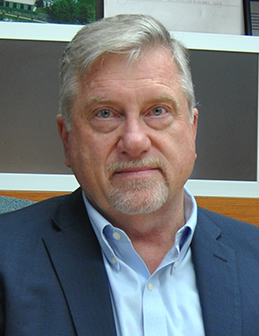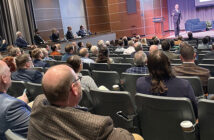Bristol-based USAntibiotics is the only domestic producer of antibiotics. Will the U.S. Government be among its customers?
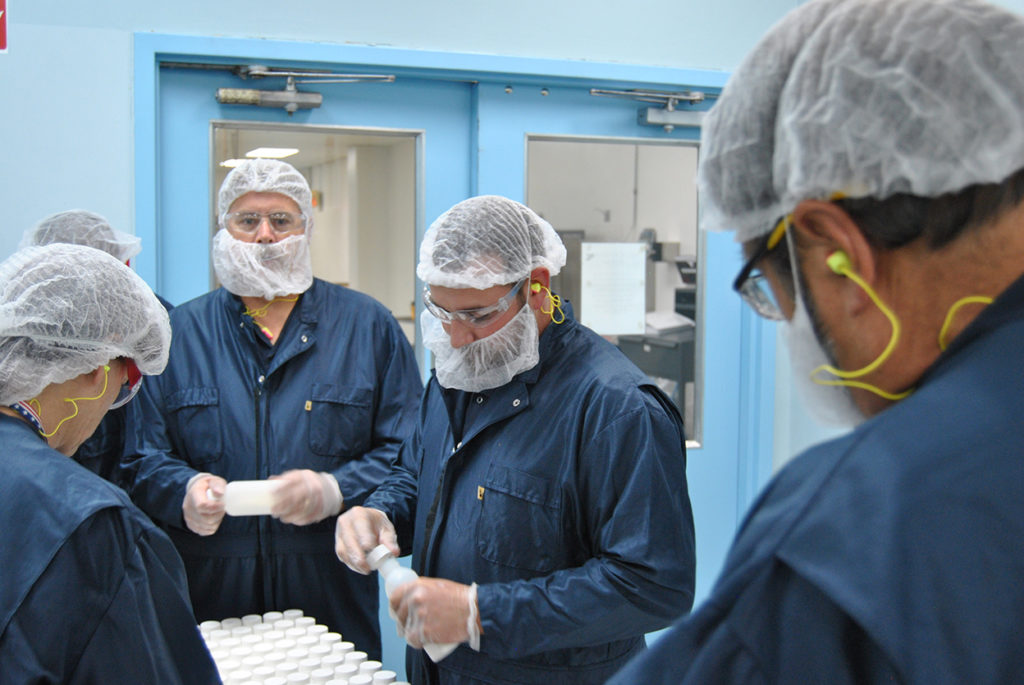
By Dave Ongie
Richard L. Jackson recalls the decision he was weighing as he sat on an airplane traveling from Tri-Cities Airport back to Atlanta.
Jackson, chairman and CEO of Jackson Healthcare, had spent part of his weekend taking a whirlwind tour of an antibiotics factory in Bristol, Tennessee, after being urged to do so by a trustee he knew. When he arrived at the facility, Jackson was greeted by a handful of workers, whom he described as “salt of the earth, hard-working and very passionate about what they do and how they save lives.”
The previous company had walked away from the facility after filing for bankruptcy, leaving a group of dedicated employees to wrap things up and maintain the plant in hopes somebody would come in and save it. They wrapped machines in plastic and made sure everything was sealed. They constantly monitored samples that needed to be tested for stability and made sure the air conditioning and electricity were on.
Those things were important since the facility needed to be kept at an appropriate level of temperature and humidity in order to remain in compliance. What is more amazing is the workers stayed the course even though they knew they’d be doing so without being paid for several weeks of work.
The reason they did so is simple. They knew that if the plant fell out of compliance, the odds of it ever restarting production would grow much longer. In short, they were the last line of defense between us and a world where the United States would not have the capability of producing its own antibiotics.
“I’ve been in healthcare over 43 years,” Jackson told the Business Journal last month. “When I found out this is something that could be shut down and the United States would not have the ability to make its own antibiotics, I was shocked. I would have thought I would have known that, but I haven’t talked to a person in healthcare that knew that fact.”
So as his plane cruised back toward Atlanta, Jackson had a business decision to make. On its face, the decision was a simple one. The Chinese have a stranglehold on the generic medication market. There is no way Jackson Healthcare was going to become rich by getting into domestic antibiotic production, and in fact, the risks of buying the plant far outweighed any financial gain. However, there was one intangible Jackson couldn’t let go.
“When I was coming back, I was just sitting there going, ‘I don’t know if I could live with myself knowing I could have saved the last plant in the United States, to have the ability and not do it.’ It was a little bit of an emotional business decision along with hopefully a little bit of patriotism,” he said. “We put it in the category of what I’m calling ‘venture philanthropy’ and saying we’ve got to give a college try and subsidize this so it can at least stay in business.”
And with that, USAntibiotics was born.
How We Got Here
Amoxicillin, which is produced at USAntibiotics, is a critical drug because it is the No. 1 prescribed antibiotic in the U.S. each year and among the top 20 medications prescribed annually. Additionally, it is recognized as one of the best treatments for anthrax in the event of a terrorist attack.
As recently as 2008, every dose of Amoxil and Augmentin was produced in the United States, but the writing was already on the wall.
By 2007, only 13 percent of pharmaceutical plants mentioned in generic drug applications to the FDA were located in the United States. Meanwhile, 43 percent were in China and 39 percent were in India, and Jackson said that was all part of the plan.
“This was planned by China,” he said. “Their government is subsidizing their (active pharmaceutical ingredients) and their manufacturing to be the lowest provider so that everybody is buying from them. You have to give it to them. They’ve done it in multiple areas.”
China first entered the pharmaceutical arena during the 1980s when the government invested heavily in penicillin fermenters. The Chinese government heavily subsidized penicillin producers, allowing them to disrupt prices around the world and begin driving Western producers from the market. In 2004, Bristol-Myers Squibb announced plans to close its factory in East Syracuse, New York, the last plant in the country still manufacturing the active pharmaceutical ingredients (APIs) used to make penicillin.
China’s chokehold on the generic pharmaceutical market doesn’t end with antibiotics. In fact, APIs for thousands of generic medications are made in China, as are many of the generic medications themselves.
The first key to understanding the current landscape is to acknowledge the difference between the branded medication market and the generic market.
Developing a branded drug that receives FDA approval and makes it to market can generate hundreds of billions of dollars. For that reason, Johnson & Johnson spent $82.6 billion on research and development in 2020, and that money came out of their net revenues generated by other branded drugs. According to the Congressional Budget Office, pharmaceutical companies have devoted approximately 19 percent of their net revenues to R&D over the past two decades, outpacing even the tech industry’s R&D spending during that time.
When a successful branded drug hits the market, it has a patent that generally lasts 20 years. When that patent runs out, the active ingredient of the name-brand drug hits the generic market where competition instantly causes the price to plummet roughly 80 to 85 percent overnight.
Jackson said producing generic medications is a cut-throat business where three major distributors look for the lowest prices they can find in order to maximize their profit margins.
“They take their pound of flesh, and since it’s almost a monopoly, they beat down the prices as much as possible,” Jackson said. “You’re competing against China. They’re going to buy it for the lowest amount, and then they’re going to pass that on and create a margin.”
Of course, American-made generic medications hardly stand a chance in this marketplace, which explains why USAntibiotics is such an anomaly. Everything from labor costs to regulation prevents most Western countries from competing with China and India.
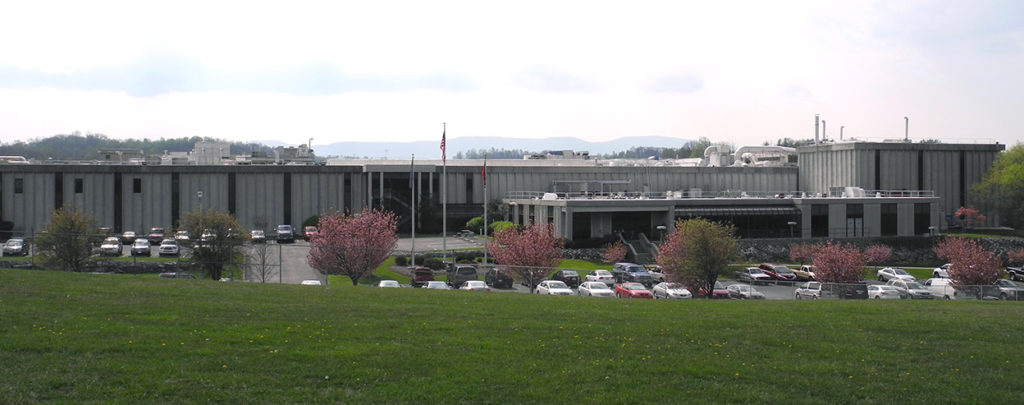
Staring Down the Barrel
When the late Ross Perot discussed the North American Free Trade Agreement during his 1992 presidential campaign, he described the giant sucking sound of manufacturing jobs leaving the United States.
But when all of our API production capability and generic medication manufacturing facilities swiftly relocated to the Far East, they all vanished without a sound. Congresswoman Diana Harshbarger recalled conversations she had with her elected officials over the course of two decades while she was running her family pharmacy, and she said pleas to repatriate our API production to the United States largely fell on deaf ears.
“China does not have to drop a bomb,” Harshbarger said. “All they would need to do is cut off our supply of APIs and finished pharmaceutical goods.”
Jackson said this realization hit home in a big way when the Trump administration was in the midst of heated trade negotiations with China back in 2017. During the course of his research into buying the plant in Bristol, Jackson talked to a person who happened to be in the room during those negotiations.
Jackson recounted the story of how the Chinese delegation sat back patiently as the U.S. delegation made demands designed to shrink the trade deficit that existed between the two nations.
“The Chinese basically said you can do whatever you want, but you can’t win a war with us,” Jackson said. “We make 100 percent of your antibiotics. At that time, that was true. That was a clear threat, and guess what? The Trump administration didn’t know that either.”
If that wasn’t a big enough wake-up call, the supply chain issues that have plagued our country during the COVID-19 pandemic have certainly added urgency to conversations about repatriating the supply chain.
“What COVID brought out was the frailties of our supply chain and how reliant we are,” Jackson said. “I don’t think people even knew we’re so reliant on so many foreign products.”
With that said, Jackson said the importance of producing critical generic drugs like antibiotics in the United States is finally on the radar screen in Washington, and Tennessee Senator Marsha Blackburn told the Business Journal as much during a recent phone interview.
“It is so essential that we return this manufacturing of pharmaceuticals and active pharmaceutical ingredients to the United States,” she said. “We have seen what happens when you can’t have what you need in a timely manner.”
Jackson certainly took note of Washington’s action when it came to repatriating the production of semiconductors. The CHIPS and Science Act offers tax breaks and hundreds of millions of dollars of funding for domestic research, development, manufacturing and supply chain security for companies that produce semiconductors in the United States.
Now Jackson is hoping the U.S. Government will attack the production of critical drugs with a fraction of that zeal.
“Just like with the Ukraine, we just can’t be looking down the barrel negotiating with China,” Jackson said. “When China is about to join Russia in a close relationship, it makes this even more urgent than it was when we bought (the plant).”
‘Failure is Not an Option’
Last August of 2021, leaders from Jackson Healthcare were joined by Harshbarger, Tennessee Governor Bill Lee and other dignitaries for a ribbon cutting at the USAntibiotics facility in Bristol.
That announcement of the reopening of the only antibiotic production facility in the United States was certainly noteworthy, but once the ribbon was cut and the news cycle rolled over, the real work began for USAntibiotics President Patrick Cashman and his team.
Almost a full year after that ribbon-cutting ceremony, Cashman sat in his office preparing to produce the first batch of antibiotics for distribution. Knock on wood, he says, they’ll hit the market this month.
“It’s been full of ups and downs,” Cashman said of his first year on the job. “There are a lot of challenges in taking the plant back up to full production again. We have to make sure it’s thoroughly clean and sanitary. There is a lot of detail work, a lot of very important protocols to follow.”
A year may seem like a long time, but it could have been longer if not for Jackson Healthcare, the employees who took care of the facility and Harshbarger’s efforts in Washington.
“Congresswoman Harshbarger has been a true friend and ally to this facility,” Cashman said. “We deeply appreciate her efforts. We’re designated as a critical infrastructure as part of homeland security. She really stepped up and helped move that through the system to get the appropriate approvals.”
If the Bristol plant had fallen out of compliance during the bankruptcy proceedings and lost its critical infrastructure designation, the facility would have essentially been dead in the water. According to Jackson’s estimates, it would take 5 to 7 years and $400 million to start from scratch given the red tape and regulations.
As it was, Jackson Healthcare invested $16 million to get the facility back up and running. A walk through the massive 400,000 square-foot facility the day before production began showed the potential of the operation as well as how far the facility has to go to get back to peak production.
You can spot scores of empty desks and cubicles scattered throughout the facility. Several production lines sit idle, a reminder of the days when over 400 people worked three shifts to churn out all of the Amoxicillin-based antibiotics needed for not only the United States, but also several foreign countries.
While USAntibiotics has spent the past year clearing regulatory hurdles, Jackson and Cashman are both well aware of the lack of oversight when it comes to APIs produced overseas, particularly in China and India.
“The FDA can come in with no notice any day,” Jackson said of USAntibiotics. “You have to give three to six months advance notice in China, and if they’ve got any problems, they’re going to clean it up before they get there. We can’t really monitor what they’re doing overseas. They can here.”
The APIs used at USAntibiotics are not produced onsite, but they do come from suppliers in Europe that have to clear similar quality thresholds to the ones American companies must adhere to. As he walks through a facility capable of producing 2.2 billion antibiotic tablets each year, Cashman knows there is a major problem facing the country that can be solved by the plant he presides over.
“It’s something we as a nation really have to address because we’re not in a good place from a medication supply/security situation,” he said. “Many medications are made overseas. As a nation, we need to decide and take action to ensure we have adequate supplies of critical medications.”
Cashman is fond of saying, “Failure is not an option.” But success will depend on a pending decision in Washington D.C.
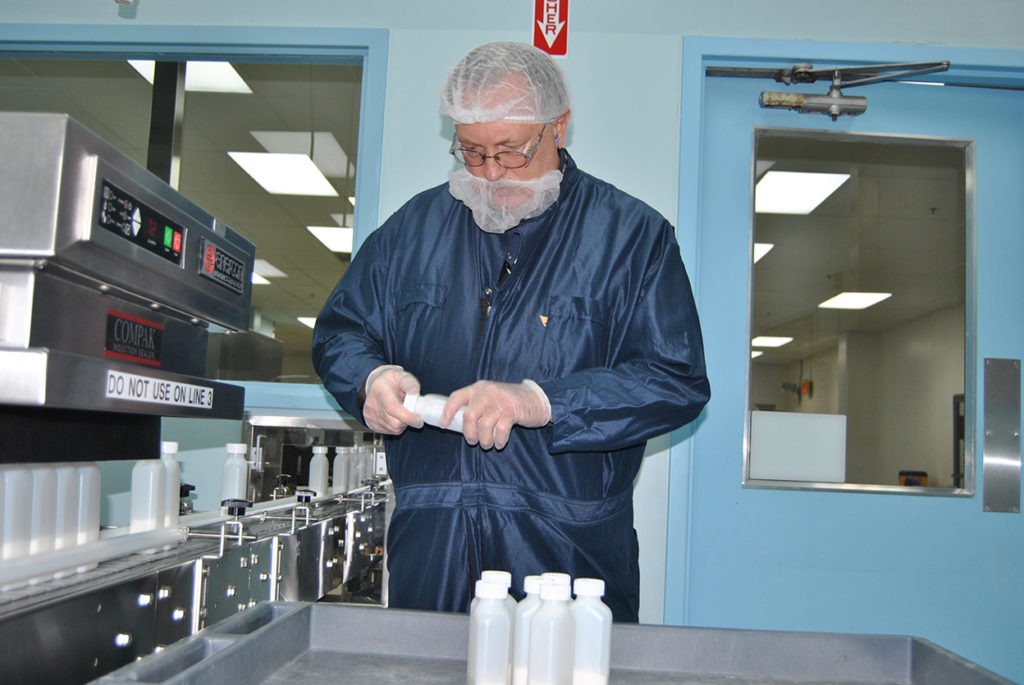
Gridlock
On Cashman’s desk sits a copy of a proposal that has been sent to the United States government.
Around the time USAntibiotics was created last August, the federal government reached out with requests for information asking if the facility was capable of producing a 1- to 2-year stockpile of amoxicillin. USAntibiotics responded quickly with its proposal, but hasn’t heard anything yet.
“The government buys for the VA, the Department of Defense and the strategic stockpile, which is the biggest one,” Jackson said, adding that the government pays around $3 per bottle for amoxicillin that is stockpiled for national emergencies.
Right now, it is unclear where the federal government is purchasing its amoxicillin, but Harshbarger expects some if not all of it is coming from China or India, at least indirectly.
“There are several efforts to cut through red tape and encourage domestic production of antibiotics,” she said. “We have to address this situation as soon as possible. Our domestic companies can produce higher quality medicine in a cleaner and safer environment than what is currently coming from China. For this reason, we should prioritize purchasing from domestic suppliers like Jackson Healthcare.”
USAntibioitcs is open, and for now that is a victory. But in order for the facility to thrive and return to the days of full production, Jackson said the United States government must commit to buying its amoxicillin from USAntibiotics for the price it is currently paying for antibiotics being produced overseas.
Jackson can see where it looks hypocritical to be against the federal government picking winners and losers in the private sector, something he says happened in the recent CHIPS and Science Act, and then petition the federal government to make USAntibiotics its exclusive supplier of amoxicillin.
For Jackson, the distinction is that he’s not asking for a government subsidy.
“In our case, we’re just asking them what they’re already buying,” Jackson said. “They can pay the exact same amount to us and not buy it overseas, and this is a solved issue. With that kind of volume, we can create synergy and create lower expenses, because we know that volume is coming in.
When the first batch of antibiotics rolled off the line and was boxed up on Aug. 26, it was headed to a private-sector generic market dominated by cheap Chinese product. That is the route that landed the plant’s previous owner in bankruptcy after losing millions of dollars year after year.
“We would love to see more of the pharmaceuticals manufactured in the United States,” Blackburn said. “We’d love to see those as a preferred item. Repatriating this manufacturing is going to be essential for us.”
For now, the ball is in the federal government’s court. If the government sees fit to hand that ball back to USAntibiotics, Jackson is confident the Bristol-based facility will be able to take that ball and run with it.
“We’re not asking for a big subsidy from the government,” Jackson said. “We’re just saying, ‘Whatever you’re buying now, buy it for the same price, but just buy it from America.’
“Our mission is really to be the 100 percent supplier for the United States, because we can do it.”
Download the September Edition here.


